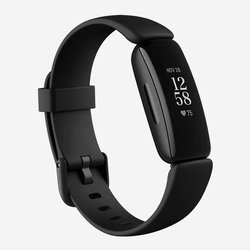
If you want a little tracking—activity, heart rate, sleep—without the extra bells and whistles, this little bracelet could be for you. Just think, in the year 1820, the word tracker meant someone who was good at finding and following animals (or people). Now, in the 21st century, tracker means technology we strap to ourselves to tell us how many steps we've taken a day. Bet they never saw that coming back in 1820.
¿Qué podría pasar si algo falla?
As of January 14, 2021, Google officially became the owner of Fitbit. That worried many privacy conscious users. However, Google promised that “Fitbit users’ health and wellness data won't be used for Google ads and this data will be kept separate from other Google ad data” as part of the deal with global regulators when they bought Fitbit. This is good.
And Fitbit seems to do an OK job with privacy and security. It de-identifies the data it collects so it's (hopefully) not personally identifiable. We say hopefully because, depending on the kind of data, it’s been found to be pretty easy to de-anonymize these data sets and track down an individual’s patterns, especially with location data. So, be aware with Fitbit—or any fitness tracker—you are strapping on a device that tracks your location, heart rate, sleep patterns, and more. That's a lot of personal information gathered in one place.
What is not good is what can happen with all this very personal health data if others aren't careful. A recent report showed that health data for over 61 million fitness tracker users, including both Fitbit and Apple, was exposed when a third party company that allowed users to sync their health data from their fitness trackers did not secure the data properly. Personal information such as names, birthdates, weight, height, gender, and geographical location for Fitbit and other fitness tracker users was left exposed because the company didn't password protect or encrypt their database. This is a great reminder that yes, while Fitbit might do a good job with their own security, anytime you sync or share that data with anyone else, it could be vulnerable. And Fitbit partners with many third parties such as employers and insurance companies. I don’t know about you, but I don’t need the world to know my weight and where I live. That’s really dang creepy.
Consejos para protegerte
- Follow Fitbit's advice to keep your stats private
- Be very careful what third party companies you consent to share you health data with. If you do decided to share your health data with another company, read their privacy policy to see how they protect, secure, and share or sell your data.
- Stop sharing friends' lists: Under “Friends” on your profile page, select Privacy Setting and then Private.
¿Me puede espiar?

Cámara
Dispositivo: No
Aplicación: Sí
Micrófono
Dispositivo: No
Aplicación: Sí
Rastrea la ubicación
Dispositivo: Sí
Aplicación: Sí
¿Qué se puede usar para registrarse?
Correo electrónico
Sí
Teléfono
No
Cuenta de terceros
No
¿Qué datos recopila la empresa?
Información personal
Name, date of birth, gender, height, weight, photo (optional)
Información biométrica
Heart rate, movement, sleep data, menstrual cycle, and more
Información social
Fitbit connections
¿Cómo utiliza la empresa estos datos?
¿Cómo puedes controlar el uso de tus datos?
¿Qué historial tiene la compañía en cuanto a la protección de los datos de los usuarios?
Unfortunately, Fitbit's security measures did not prevent the major data leak of 61 million fitness tracker data records, including Fitbit user data, by the third party company GetHealth. In September 2021, a group of security researchers discovered GetHealth had an unsecured database containing over 61 million records related to wearable technology and fitness services. GetHealth accessed health data belonging to wearable device users around the world and leaked it in an non-password protected, unencrypted database. The list contained names, birthdates, weight, height, gender, and geographical location, as well as other medical data, such as blood pressure.
¿El producto se puede usar sin conexión?
¿La información de privacidad es fácil de entender?
Despite being acquired by Google, Fitbit keeps its own privacy policy, written it relatively simple language.
Enlaces a información de privacidad
¿El producto cumple nuestros estándares mínimos de seguridad?

Cifrado
Contraseña fuerte
To create a Fitbit account, users are required to provide strong, complex, passwords during onboarding.
Actualizaciones de seguridad
Gestiona las vulnerabilidades
Política de privacidad

Profundiza más
-
Google Now Owns Fitbit: What It Means For Your Fitness Data PrivacyForbes
-
61M Fitbit, Apple Users Had Data Exposed in Wearable Device Data BreachHealth IT Security
-
Google closes $2.1B acquisition of Fitbit as Justice Department probe continuesFierce Healthcare
-
Here's what your Fitbit knows about youAvast
-
Fitbit Joins GoogleFitbit
-
How to Lock Down Your Health and Fitness DataDavid Nield
-
We read your wearable tech's privacy policy so you don't have toWareable






Comentarios
¿Tienes algún comentario? Queremos escucharte.